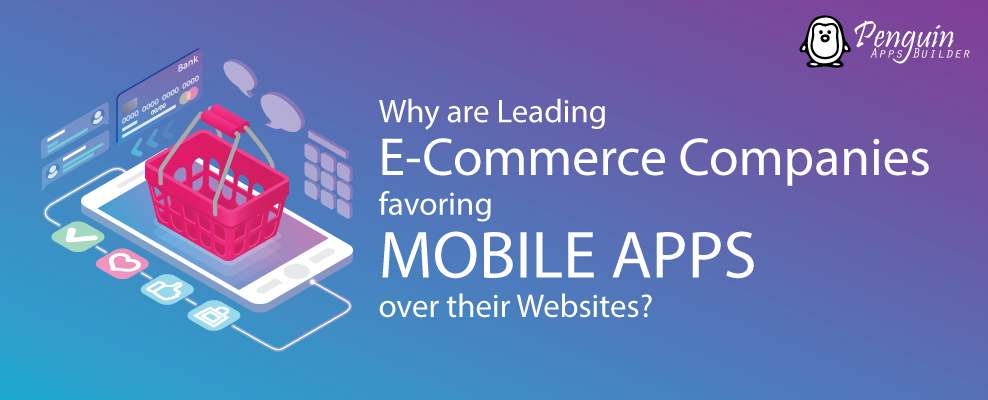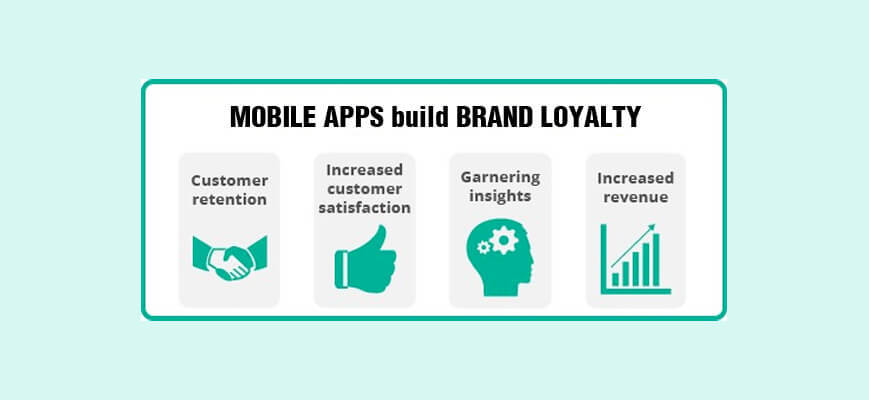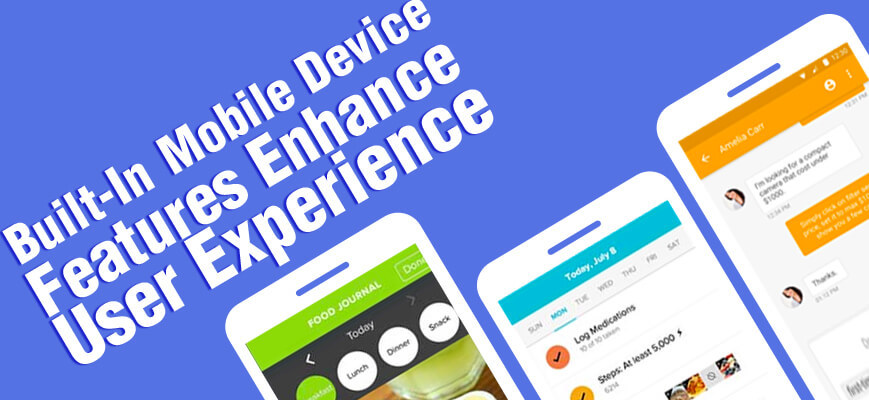
It is not news that most of the leading e-commerce companies including Amazon and Flipkart are being partial to their mobile apps as compared to their good old websites. They have been promoting the mobile apps and encouraging more and more users to engage with their mobile apps in place of their trusted websites and have been mobile only deals and discounts to the users. Penguin Apps Builder has been fortunate enough in having worked with a great number of e-commerce businesses all over the world and have helped them make their own mobile apps for their business. Hence, to us too it did seem intriguing at first. To sate our curiosity, we delved deeper into the subject and have come up with the following reasons for you.
#1 Rising Popularity of Mobiles
It might be an understatement to say that the popularity of mobiles is on a steep curve of rise. Everything is done through them today, everyone has them, and they have assumed a variety of roles in the lives of the mobile users from personal assistants to shopping companion and a source oozing with information to be used as per their needs.
This fact is impressed upon even more strongly as 54% of all the mobile transactions in 2016 were in fact generated within the app. What is even more encouraging is that the top one fourth of the retailers confessed to their 50% of the total sales coming in from mobiles.
According to Shopify, one of the largest eCommerce platforms for small and medium businesses to create and launch their e-commerce websites, 58% of the checkouts on their platform were completed through mobile devices.
Additionally, it has also been brought to light through research that mobile device users spend about 86% of their time in native apps.
The consumers today are becoming increasingly dependent on their mobile devices and have gotten used to instant gratification. The consumers today expect to get what they want exactly as they want it, exactly when they want it. Hence the demands on the brands is mounting up to deliver to their whims.
e-commerce or the online retail is an entirely consumer centric business, so the entire process of buying and the manner in which the customer wants to make the purchase is the deciding factor, and the retailers cannot do anything about it. There is a huge shift in the way a consumer thinks today, and it is this transition in their mindset that has caused mobile to attain the status of the single most important channel or medium to which the modern-day retailer needs to pay attention.
It is only after much research and a deep look into the analytics and user behavior study that the brands have realized that though mobile web has helped in the past and continues to expand the reach of their brand to the audiences, it is the mobile apps that actually help them convert. Let’s move to the next step to understand why and how.
#2 Apps Bring in Higher Conversions
Quite simply put, the conversions through mobile apps is unparalleled. All the leading e-commerce portals are coming to this realization which is why they are inclined today to bet high on mobile apps and receive higher conversions when compared to mobile web and desktop.
As compared to mobile web, mobile apps convert 300% higher and when compared to desktop they convert 150% higher.
It is these figures that are urging more and more ecommerce brands to lean heavily on their mobile apps. Mobile apps are notorious for closing higher number of transactions with customers by delivering with more efficiency than any other medium or channel. In fact, the average order value on a mobile app is higher than the desktop and mobile browser put together which means that the mobile apps yield higher shopping cart value than mobile web and desktops.
#3 Apps Help Retain Customers & Build Brand Loyalty

It is comparatively easy to attract new customers with lucrative tactics, but to actually retain a one-time customer is way harder. Most of the businesses fail to get users to keep coming back to their stores. It is, in fact an established fact that it takes seven times more to gain a new customer than to retain an existing customer. Hence the importance of retaining an existing customer need not be stressed upon.
If you want your ecommerce business to keep growing and reaching new heights, it is imperative that you constantly stay in touch and communicate well with their customers and update them about your products, new launches, special discounts & deals, and any other relevant information.
When you employ the push notification feature within the app it can serve as one of the strongest and most effective tools that a business can employ. A well-designed, and well-timed push notification that communicates value to the customer has the potential to boost up customer retention by up to 200%! It has been established through valuable and dependable analytics and research that the open rates for push notifications is twice that of an email.
The first-time mobile app users are more likely to come back to your app and use it within 30 days of first using it, as compared to the users on mobile websites, when push notification is enabled. There has been a debate about whether push notifications are intrusive or not, however, it has been recorded that 50% of the users opt in for the push messages or notifications and find them useful. When you manage a higher retention of customers, you have the opportunity of a better chance at creating lifetime value customers. Push notifications is one of the treasured features of a mobile app, as it not only helps you dispel the right information, but also helps you build a connect with the consumer leading to a slow buildup of brand loyalty that may stay forever.
A mobile device, by its trait is mobile, which means that it is always in the hands of the user and they are using it all the time for a variety of functions and uses. The mobile apps in fact become the users’ virtual eyes, ears, and arms. The most amazing things here is that even if the people who have installed your app are not using it directly, they are looking at it every time they scroll through their screens, which means they are reminded of your brand, each of these times.
#4 Apps Engage Customers Better
As compared to the regular or mobile websites, mobile apps offer far better opportunities of engagement with the users. A mobile app enables the users to access your content with a simple tap on the icon, instead of having to reach out to their computers opening a specific URL, and all this while be presented with a hundred other distractions.
Getting a customer to install your app on their phone is half the battle won, but only half. Whether it is push notifications or any other means, you need to be in constant touch with the customers, staying on top of each and every requirement or demand from the customers that comes your way. Not only does this engage your customers more, but also boosts their loyalty towards you
#5 Convenient Access to Retail Stores
The customers and the retailers, both confess that the mobile applications simplify the way or process to access a particular brand when they are using a smart phone. It takes just a click or rather a tap from the customer to reach all the lucrative deals and discounts that the retailers have in store for them. The advent of ‘big data’ in retail, has made it possible for the mobile apps to show the customers products and offers that are in sync with their buying behavior and preferences.
The mobile applications are known to deliver a higher and better performance, and a more satisfactory user experience as compared to the conventional websites. This, in fact is the main aspect that is at the root of all the hullabaloo about creating an app for ecommerce businesses.
A mobile app has the capability of assuming the role and responsibilities of a relationship manager between the retailer and the customers. In the current industrial environment, a well designed mobile app is an absolute essential in building a loyal user base for any brand, and it is the same for an ecommerce website.
It has been established that more than 73% of the mobile shoppers use apps only from their favorite brands.
#6 Built-In Device Features Improve the Experience

App development companies like Penguin Apps Builder who develop mobile e-commerce apps offer a great range of features and offer apps that are optimized to be used across all mobile devices of varying operating systems, screen sizes and resolutions. This means when you have a mobile app for your ecommerce business you are offering to your users’ great performance and an easy access to all the inbuilt features of the mobile device that it is going to be installed on, including but not limited to its camera, GPS, microphone, calendar, and more. In some of the apps, the built-in features of the mobile devices have been used ingeniously and have created intriguing, exciting, novel experiences for the users. As an example, you can put to use the calendar feature on the users’ phone and set up an event on their device for the day a sale goes live on their online or offline store, earning them the ability to remind the user of the event. The camera on their mobile device can be used to set up a virtual fitting room or trial room to see how the clothes or accessories fit the user in a simulated environment.
It is this innate ability of a mobile app to integrate seamlessly with the features that are built-in to the smartphone including the camera, microphone, GPS and others. The great thing about smartphones is that they come loaded with a multitude of features that can be harnessed to provide exemplary and engaging user experience. Camera on the users’ mobile devices let you simulate a virtual fitting room, GPS when enabled on the users’ phones can help you offer special discounts, deals, and delivery options based on their location and the location of the stockist or vendor. Users have also been using the microphone feature in their smartphones to voice search the products they are looking for, instead of typing it all out.
#7 Sharing on The Social Media Is Easier Through Apps
This is the era of social media. Everyone who is anyone is on social media and everyone who is no one is also there on the social media. We look for recommendations on the social media, we vent out on the social media, we connect too on social media. It has so creatively woven itself into our lives that we have inadvertently started becoming dependent on it to quite an extent. A mobile ecommerce app lets you and your users connect on the social platform.
Social media integration for your app lets the users share their experiences, and the content they come across on your app on social media where it can be accessed by their friends and family, providing you with an effective, organic, and free medium of marketing.
People create and share an identity or a part of their identity on the social media and all the content they share is exposed to an audience which is great for any business. Users have a tendency to ask for advice or recommendations from other friends or contact on social media and when you have an existence on social media, and are endorsed by people, it can be a big surge for you. This can give you the advantage of a shop assistant, but in a more efficient and effective manner.
It is for these reasons that, today most of the leading e-commerce companies are promoting their apps over their websites and encouraging the users to engage more with their mobile apps than any other medium including their dedicated websites.